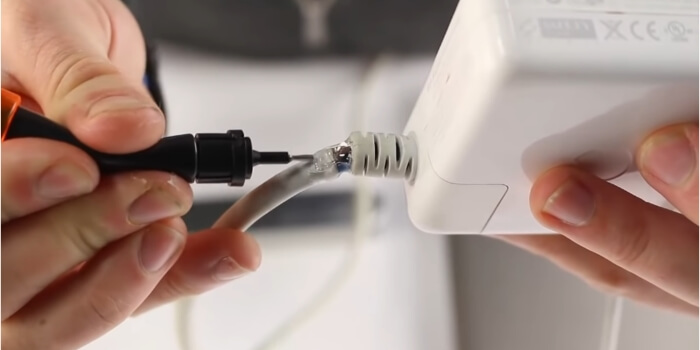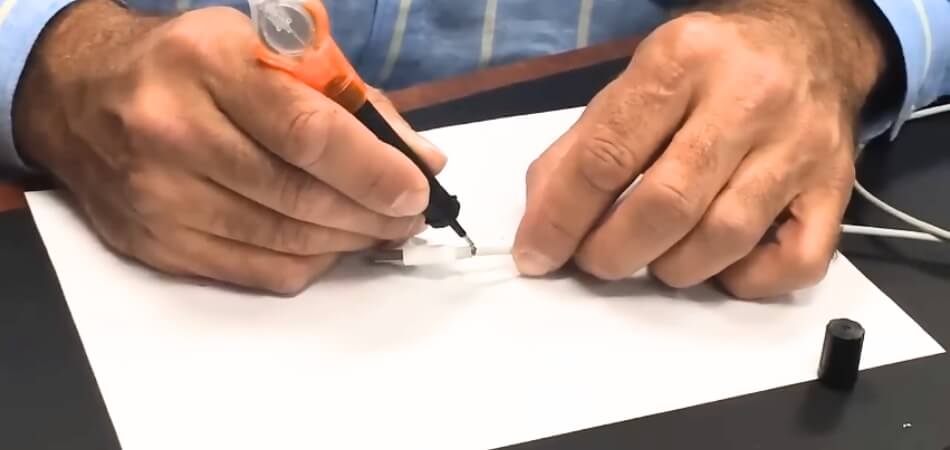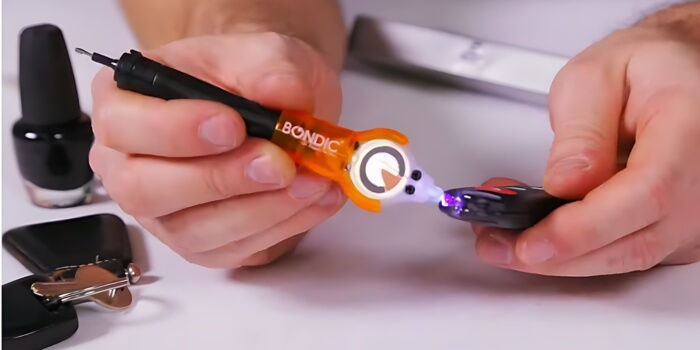Superglue is renowned for its ability to form strong bonds by polymerizing with moisture present on surfaces. The electrical conductivity of this adhesive remains a subject of curiosity and practical consideration despite its bonding strength and versatility. That is why people often ask: Does superglue conduct electricity?
Cyanoacrylate or superglue adhesive, does not conduct electricity as it’s an insulator. Its chemical structure lacks free ions or electrons required for conductivity. When applied, it forms strong bonds by polymerizing with moisture, but it doesn’t facilitate electrical flow. Therefore, it’s safe for electronic applications.
However, there are lots of facts you might need to know about superglues. Here we will describe everything. So, keep reading to explore them all.
Superglue Adhesive: Composition and Bonding Mechanism
Cyanoacrylate adhesive, commonly known as superglue, boasts remarkable bonding strength attributed to its unique composition and bonding mechanism. This adhesive typically consists of cyanoacrylate monomers, which polymerize upon contact with moisture to form strong bonds.

The rapid polymerization process is triggered by the presence of trace amounts of water on surfaces, enabling quick adhesion.
Upon application, the cyanoacrylate monomers initiate a chain reaction, cross-linking with each other to create a durable bond.
This bonding mechanism relies on the formation of strong molecular connections between the adhesive and the substrate, resulting in a tight grip. The resulting bond is known for its strength, often surpassing that of traditional adhesives.
The comprehension of the composition and bonding mechanism of cyanoacrylate adhesive provides insight into its exceptional performance in diverse applications. Superglue offers reliable adhesion in a wide range of materials and environments by harnessing the power of moisture-triggered polymerization.
Does Superglue Conduct Electricity?
Superglue is well-known for its bonding strength, but its conductive capabilities remain a subject of inquiry. People who love experiments often wonder: Does superglue conduct electricity?

Well, due to its molecular structure lacking free ions or electrons, superglue typically does not conduct electricity. It excels at creating strong bonds, but its molecular structure lacks the necessary components like free ions or electrons, which are essential for conducting electricity.
This characteristic renders superglue typically non-conductive, making it safe for a variety of applications where electrical conductivity is not desired or required.
Where to Use Superglue?
Superglue is a versatile adhesive that can be used in various applications, from household fixes to crafting projects. Its reliable bonding strength makes it a go-to adhesive for many. Let’s explore the diverse range of uses for superglue.
Household Repairs
Superglue is ideal for fixing broken items around the house, such as ceramic figurines, plastic toys, or metal hinges. Its quick-drying nature ensures rapid repairs, allowing you to tackle minor mishaps with ease. Whether it’s reattaching a handle or mending a cracked vase, using superglue like Bondic will provide a strong and durable bond.
Crafting and DIY Projects
Crafters and DIY enthusiasts appreciate superglue for its precision and effectiveness in assembling intricate pieces. Whether you’re working with wood, fabric, or paper, superglue offers a reliable solution for bonding materials together. Its ability to form strong, invisible bonds makes it perfect for crafting delicate jewelry or intricate models.
Jewelry Repair
Superglue is a handy tool for repairing broken jewelry components, such as clasps, beads, or metal findings. Its fast-acting formula ensures quick fixes, allowing you to wear your favorite pieces again in no time. Whether it’s reattaching a loose stone or securing a broken chain, superglue provides a discreet and long-lasting solution.
Automotive Fixes
In automotive maintenance, superglue can serve as a temporary fix for minor repairs, such as securing loose trim or fixing interior components. Its strong adhesive properties make it suitable for bonding materials like plastic, rubber, or metal. However, for more permanent fixes, specialized automotive adhesives may be required.
Electronic Repairs
Superglue can be used in electronic repairs to secure small components or mend cracked casings. Its non-conductive nature ensures that it won’t interfere with the electrical connections. However, caution should be exercised to avoid applying superglue directly onto sensitive electronic components, which could cause damage.
Medical Applications
In emergencies, superglue can be used as a temporary solution for closing minor cuts and wounds. Known as “liquid stitches,” medical-grade cyanoacrylate adhesive forms a waterproof seal over the wound, promoting faster healing.
Benefits of Using Superglue
Superglue offers a multitude of benefits beyond its adhesive properties, making it a versatile tool in various applications. Here are some of the key advantages of using superglue:
- Quick Fix: Superglue dries rapidly, allowing for swift repairs of broken items, saving time and hassle.
- Strong Bond: It forms a durable bond between materials, ensuring long-lasting repairs that withstand everyday use and wear.
- Precision Application: Its fine tip applicator enables precise placement of adhesive, ideal for delicate projects and intricate assemblies.
- Versatility: Superglue adheres to a wide range of materials, including plastic, metal, wood, and ceramics, making it suitable for diverse applications.
- Convenient Packaging: Available in various sizes and formats, from single-use tubes to multipacks, catering to different needs and preferences.
- Minimal Mess: Its low viscosity formula minimizes drips and runs, reducing the risk of accidental spills and messes during application.
- Space-Saving: Compact and portable, superglue tubes can be easily stored in toolboxes, drawers, or pockets for on-the-go repairs.
Important Tips for Using Superglue
A few simple tricks can really help you get the job done right when it comes to using superglue. Here are some important pointers to keep in mind:

- Clean Surfaces: Ensure the surfaces to be bonded are clean and free of dust, oil, or moisture to promote optimal adhesion.
- Apply Sparingly: A little goes a long way with superglue; apply a small amount to one surface and press firmly to avoid excess glue seeping out.
- Use Caution: Handle superglue with care to avoid skin contact, and work in a well-ventilated area to minimize exposure to fumes.
- Avoid Heat: Keep superglue away from heat sources as high temperatures can accelerate drying and potentially compromise the bond.
- Store Properly: Seal superglue tightly after use and store it in a cool, dry place to prevent premature drying and extend its shelf life.
- Test Compatibility: Before applying superglue to a surface, test compatibility on a small, inconspicuous area to ensure it won’t damage or react adversely.
- Seek Medical Attention: In case of skin or eye contact, seek immediate medical attention and follow recommended first aid measures to prevent irritation or injury.
Frequently Asked Questions
Here are some frequently asked questions and their answers regarding whether superglue conducts electricity.
Can Superglue Be Used in Electronics?
While superglue is generally non-conductive, it can be used in electronics for non-electrical bonding purposes, such as securing components or repairing casings without interfering with electrical connections.
Will Superglue Affect Electrical Components?
Superglue should be used cautiously around electrical components to prevent accidental contact. While it’s non-conductive, excessive glue can cause damage or interfere with delicate circuits if not applied carefully.
Is It Safe to Use Superglue on Circuit Boards?
It’s generally not recommended to use superglue directly on circuit boards, as it can potentially damage sensitive components or interfere with their functionality. Specialized adhesives designed for electronics are preferred for such applications.
Can Superglue Insulate Electrical Connections?
Superglue can provide insulation for electrical connections if applied carefully to prevent contact with conductive materials. However, it’s essential to ensure proper clearance and avoid excessive glue buildup.
How Can I Bond Electrical Components Without Conductivity?
For bonding electrical components without conductivity, consider using specialized non-conductive adhesives designed for electronics. These adhesives provide strong bonds while ensuring electrical insulation.
Are There Alternatives to Superglue for Electronic Applications?
Yes, there are alternative adhesives specifically formulated for electronics, such as epoxy adhesives or silicone-based sealants, which offer both strong bonding and electrical insulation properties for electronic applications.
Conclusion
The diverse applications and properties of superglue provide insight into its significant role in various fields. That’s why many of us often want to know: Does superglue conduct electricity?
It’s great for fixing things around the house, crafting, and more, even though it’s not wired for electricity.
However, caution must be exercised when using superglue around electrical components to prevent any potential damage.
Its enduring presence in our toolkits underscores its value as a go-to adhesive for both professionals and DIY enthusiasts alike.






